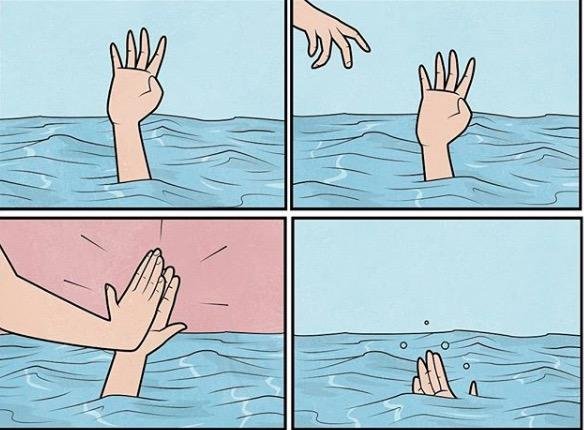In the Press: BuzzFeed
Our Partners and Founders spoke with BuzzFeed about how to know when it’s past burnout and time to quit your job. Burnout is something we hear about consistently and candidates are experiencing it more and more in the post-covid world. It’s also something we have of course seen within our own team. This reason is why we wanted to try and put together a guide for combatting burnout and learning how to avoid it. Everyone is so different there will never be one solution, but we hope some of the listed below you will find helpful! We had a chance to share our insight with BuzzFeed in hopes of sharing our advice with more of you. You can read the full article below:
Editor: Evie Carrick
So you're over it. But, as you've probably already figured out, quitting your job is easier said than done.
Your job gives you routine, stability, and a paycheck. It may make you unhappy, but it's a known evil, and for most of us, a known evil can feel safer than the unknown.
Hence, the problem.
If you're not in a position to quit your job, you may be asking yourself exactly how you're going to make it work. I asked the founders of the recruitment agency, Monday Talent, for their advice.
What is burnout?
Burnout is a feeling of exhaustion — be it emotional, physical, or mental — that's caused by excessive and prolonged stress.
Williams says burnout may show up as "the sensation of drowning and feeling unable to save yourself, or a drained battery that can no longer hold its charge." She says, "People who experience burnout often feel overwhelmed to the point that they are paralyzed. Their work productivity suffers; they become increasingly cynical and increasingly withdrawn."
1. Burnout is often caused by unresolved or untreated stress, so the first step is to face that feeling head on (as uncomfortable as that sounds).
When you feel stress or anxiety building, it's easy to grab your phone and distract yourself. But Williams says you shouldn't "push these feelings away, you need to address them head on before you become completely burnt out!"
And even though there are a million things (likely work things) you need to be doing, Mednick says "It's important to put yourself first ... In my opinion, facing burnout head-on can improve your performance at work. If you address the things that are causing the burnout and utilize some of the tips to combat burnout, your performance will improve because you will have set those boundaries upfront."
2. Once you've got it in your sights, try and identify the root cause of your stress.
The trick is to face and deal with these feelings before they get so big they feel insurmountable. To key in on what the root cause may be, consider these prompts from Williams:
"Are you overwhelmed by how much work you have on your plate? Are you exhausted from working overtime to try and keep up? Do you feel like you don't have the support you need to complete certain tasks?"
3. Talk it out with a friend, family member, or therapist.
When you're in the thick of it, pinpointing what is causing you stress and anxiety can be tricky. Williams says that "If you are unable to pinpoint where your stress is coming from, try talking to someone. It can either be a professional therapist, a close friend or a family member." Mednick notes that "there are likely others who can relate to this feeling at some point in their lives. Talking it through can help to identify what is contributing to burnout so that you can make the necessary changes."
If your friends and family members aren't helping and you need to call in the big guns, start by checking out BetterHelp or Talkspace.
4. Then, have a sit down with your boss. (Trust me, unless they are a very foolish fool, they'd rather hear this than lose you or have to deal with your lack of productivity down the road.)
When it comes to talking with your boss, McLaughlin suggests you "come with specific examples of why you are burning out and solutions to prevent it, like: support for certain tasks, time off, more training or further hiring for your team. Keep it simple and concise, your boss is not your shrink. And remember, you are not alone, this is a very common issue."
So, if the root of your stress is that you feel unsupported, you might ask for weekly checkins or extra help on a certain project.
5. Rope in your colleagues (especially if your boss is unsupportive).
The solution to your burnout may be as simple as letting your teammates know where you're at and asking them for help. Chances are they've been there, too.
"Maintain open and honest dialogue with your colleagues. Let them know what you need from them to feel supported," says Williams.
6. Step back and organize your tasks and your time. Not great at that? Ask for help.
When you have a huge list of tasks and a looming deadline, you may feel stuck. Williams says, "Knowing what you have to do and when you should be doing it can be a great way to prevent feeling overwhelmed which is one of the leading causes of burnout."
She suggests taking a step back to prioritize your tasks and organize yourself. And if organization and time management isn't your cup of tea, she says "you may need help from a direct manager or a trusted advisor."
7. Start saying no.
If you're experiencing burnout at work, chances are you've taken on too much. It can be hard (and sometimes feel impossible) to say "no" when your boss asks you to take something on.
But Williams says, "It is much better to take on a workload that you can handle vs. trying to take on too much and not delivering your best work on any project or even worse, burning yourself out."
8. Burn off some steam through exercise or check in with yourself.
You've heard this one before, but are you doing it? Williams says, "There is a reason why exercise is often suggested as a way to combat stress or burnout. Exercise truly is directly linked to your mental health."
Another idea is to try mediation. "Meditation allows you to check out from the chaos in your brain for even just a few minutes, which really makes a difference when trying to sort through mental clutter," explains Williams, who recommends starting with the guided meditations on Headspace.








